“Paddling up the inlet feels like a reverent intruder entering a magnificent throne room. Along the fiord’s steep sides, bald eagles stoically perch on ancient treetops protruding from the fogged mountain slopes. From this high vantage, they stand sentinel, guardians of a sacred place that keeps nature’s secrets…”
I wrote these words in summer 2012, after falling in love with one of Clayoquot Sound’s remotest corners. A pristine region on Vancouver Island’s west coast, the inlet radiates the mystical air of the Pacific Northwest more than any other place I have visited. A dramatic topography covered in an exquisite expression of the ancient temperate rainforest ecosystem, the river valley and adjacent fiord are powerfully humbling.
The wild charm of the place cast a spell over me. After venturing out there on kayak trips and camping in the valley for one or two nights, I knew I would return some day to spend much longer.
Sander Jain’s terrifying Sasquatch encounter in Clayoquot Sound
In early summer 2014 everything seemed to fall into place. I prepared for a stay of one to two months. A solitary, hidden cabin clinging to the vastness of the wild scenery and representing the only human trace in this realm would act as a perfect home base. My intention was to explore the nature of wilderness living, tune in with this region’s pristine air, observe wildlife and sharpen my senses in interplay with the natural world. I wanted to deeply connect to the feeling of being in this place and situation rather than exploring the place itself.
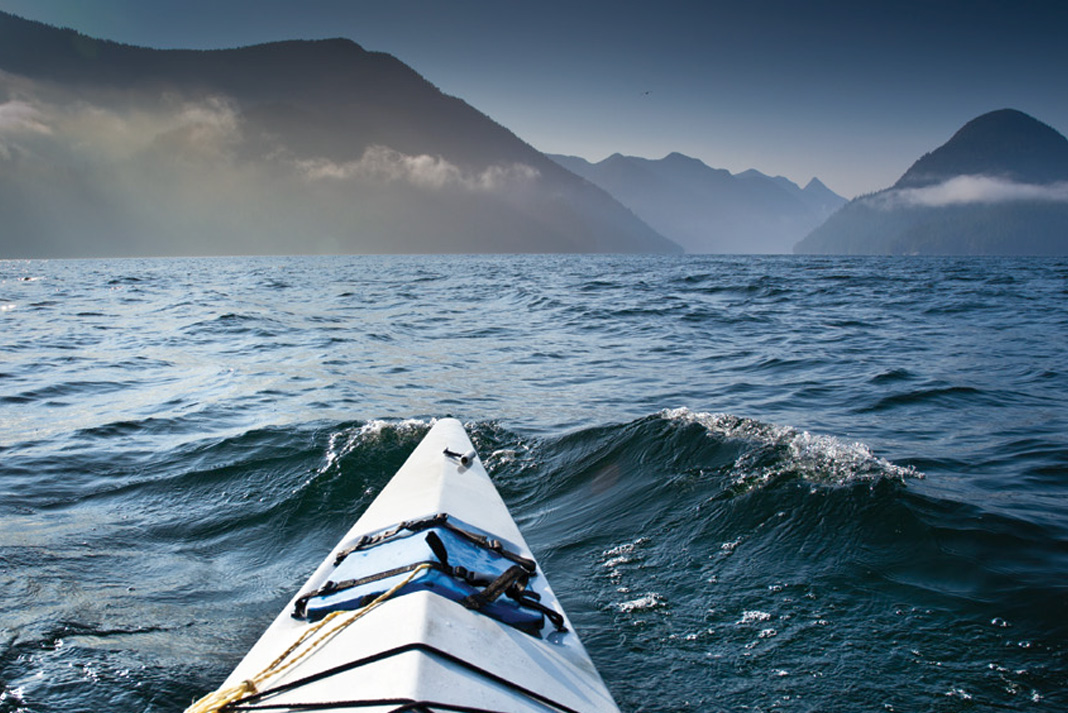
The spirit of this trip would be quite different from my past wilderness journeys, in that I wasn’t looking to go on an ambitious destination-driven adventure. My aim was simply to see what I could learn from being myself in my favorite wild place.
I found myself heading out into the sound on a sunny morning in mid-July. When the shuttle boat I had hired entered the mouth of the inlet, I felt the overpowering dimensions of the place reduce our human scale to insignificance.
A rustic cabin in the woods
The cabin nestled secretly between the waterline and steep forested mountain slopes behind. I unloaded my kayak and boxes full of gear, waved at the driver and watched his boat disappear into the distance. This had been my dream for two years. I moved into the cabin, settled in and started the simple, rustic, yet very comfortable and gentle way of wilderness living I had imagined.
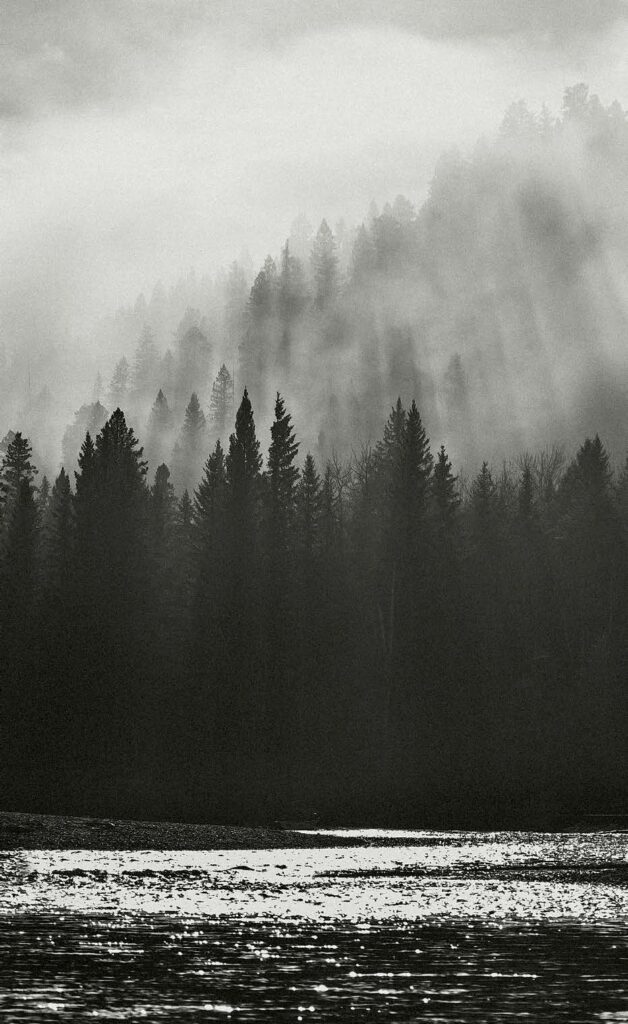
this is what mortal fear feels like.” | Photo: Sander Jain
The cabin was an ideal home base and a safe shelter. The days were sunny, without a single cloud in the sky, the nights starlit and cool. I observed the morning fog lifting off the mountains and the fiord when I awoke, saw the tides roll in and out in front of the cabin, watched the light revealing the many different facets, shades and moods of my favorite place.
In most wild and abundant places, you rarely see the wildlife, although it is there on its elusive missions, defying human understanding. Here, however, bald eagles, kingfishers, gulls, ducks, seals, sea lions and river otters revealed themselves quite frequently. The haunting call of a loon traveled across the water from the estuary in the evening, and often I could hear the deep booming of male sooty grouse resounding from deep inside the mountain valleys.
I paddled to the river estuary each day and evening, quietly sitting in my kayak, observing and listening. After dark, I ate dinner by candlelight inside the cabin, and then switched on my headlamp to write wildlife reports and journal notes. Later, I lit incense sticks to keep the mosquitos away and fell asleep comforted by the solitude of this remote place, so used to echoing back at itself without the attendance of a human witness.
My mind was free of distractions, and time seemed to stretch—four beautiful days of living in the moment felt like weeks. I came to realize that part of the beauty of my favorite place and its appeal to me was its unapproachable seclusion. As much as it was a place of bright beauty, abundance, peace, retreat and serenity, it also carried an obscure air of reticence, inaccessibility, twilit hostility and deep mystery.
I could sense nature’s inexhaustible potential and energy there. It was wild. A place for humans to visit but not to remain.
Boulders rolling in the night
On the fifth day, I lay down for a nap in the afternoon and awoke to the filtered light of early evening. I launched my kayak and went for my customary paddle to the river estuary. When I returned, I noticed the first weather change since my arrival. After dinner, I stepped outside onto the front porch. The clouds were a lid sealing the roof of the fiord and making the standing air close and muggy. In the pitch-black beyond the porch, the night was conspicuously silent. The water was still, there wasn’t a breath of wind, and I couldn’t hear any bird calls or seals catching fish close to shore like the previous nights.
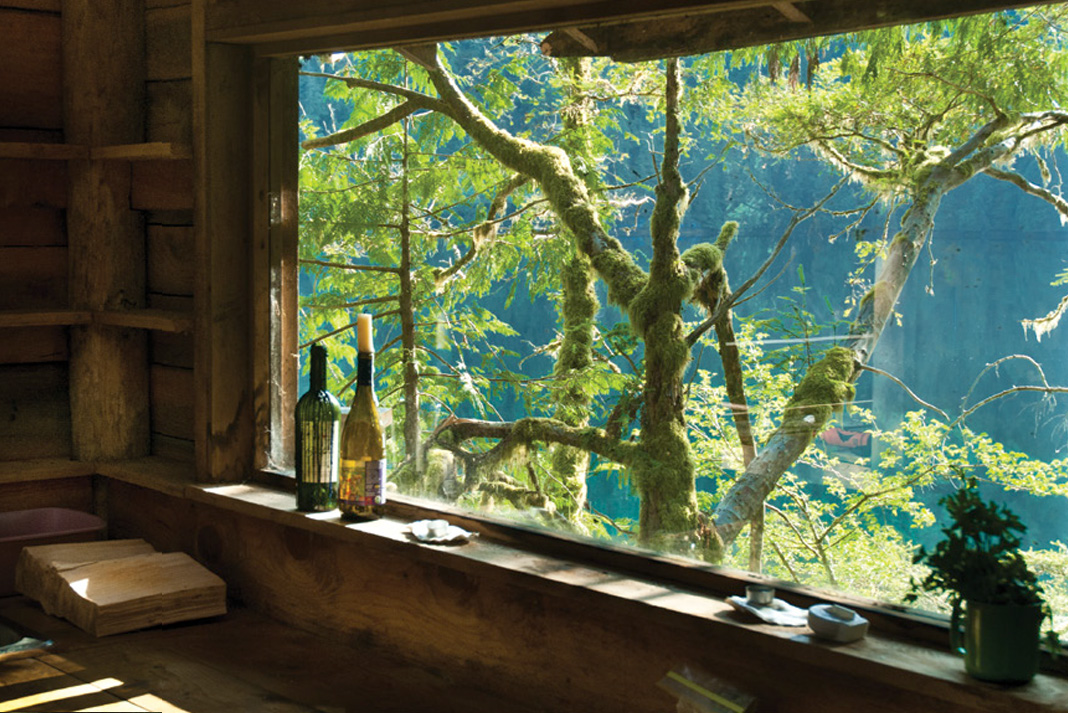
I went back inside and exchanged texts with my friend in Tofino on my satellite communication device. Then I heard a strange sound somewhere in the distance. I stepped back out onto the porch and listened carefully. Yes, there it was again. It sounded as if big rocks or boulders were being turned over or thrown.
It must be a black bear looking for a late night snack in the intertidal zone, I reasoned, or perhaps rocks loosened by the change in temperature falling out of the cliffs. I strained to hear any other clue as to the source. That’s when the strange, owl-like vocalizations started. It seemed like several of them replying to each other from different locations in the distance. Between these sounds was absolute silence.
Half an hour later, the tumbling boulder sounds continued. Brushing my teeth, I tried to convince myself that the periodic silences were peaceful rather than strained. Suddenly, one of the rock sounds erupted with the intensity of an explosion.
It was much closer than before!
My toothbrush nearly fell out of my mouth. My hairs stood on end. Was I not alone? Was there illegal logging nearby? I hadn’t seen any lights, no traces of human activity at all. It couldn’t be, especially not at 11:45 at night. No, I was completely alone in this remote corner of Clayoquot Sound. And I was beginning to feel it.
My instincts told me to retreat into sleep. I had probably just allowed myself to get spooked. I felt almost comfortable retiring to the cozy half-attic under the roof, away from the dark window panes that stared blindly out into the raven-black night from three sides of the cabin. Very soon, I drifted into sleep. The rock sounds and eerie calls continued cutting the silence outside.
“I was rudely awakened from my dreams into a nightmare. I sensed this is what mortal fear feels like.”
I was rudely awakened from my dreams into a nightmare. Fully and immediately present, my eyes opened widely, my breath came to a stop, my heart pounded wildly and I felt a torrent of adrenaline flood my body. I was petrified. My senses had never been more acute. I sensed that this is what mortal fear feels like.
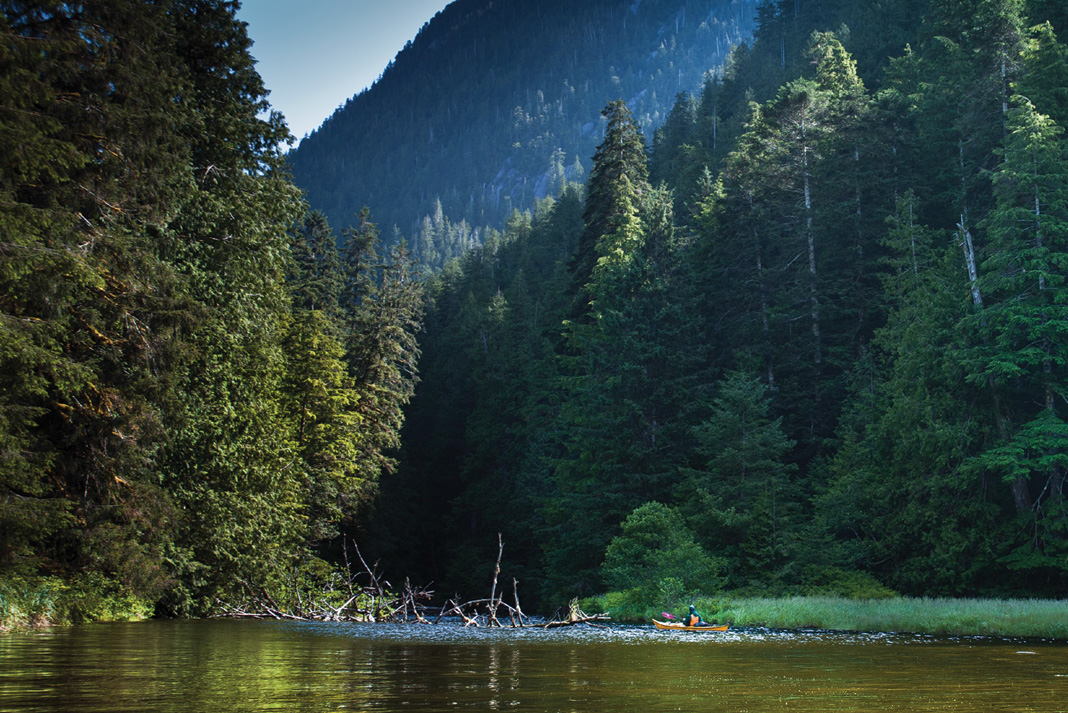
Loud stomping on the ground right next to the cabin’s surrounding boardwalk shook me to the very core. Each stomp made the cabin tremble. The massive force applied and its rhythmic nature were absolutely intimidating. More than that, they were beyond anything that I could associate with the animals you would usually expect to encounter in these forests.
The stomping was joined by the most horrifying vocalizations— disturbingly erratic and deliberate at once, tribal, not quite like human speech but similar enough to recognize certain elements. It sounded as if something was trying to speak, shout, articulate itself without quite mastering the language.
It is our senses that are the primary knower of truth and not our mind. Even before my brain jumped in with a thought, my senses understood the message: Clear out! Go away! Leave! We are here! You cannot be here!
I suddenly yearned to start a life in the city and work in the safe boundary of an office, drawing a heavy curtain around everything that is wild.
After several seconds of this turmoil, I heard them leave with emphatic steps. Two bipedal creatures erratically running off with tremendous speed and agility, each footfall causing the ground and the cabin on it to tremble.
I pressed my hands against my ears as hard as I could. I wanted to seal off my senses. I hid under my sleeping bag in the darkness, every muscle in my body strained, fully covered in cold sweat. For the next few hours I remained frozen, still pressing my hands against my ears and vowing that I would leave as soon as the light of dawn released me.
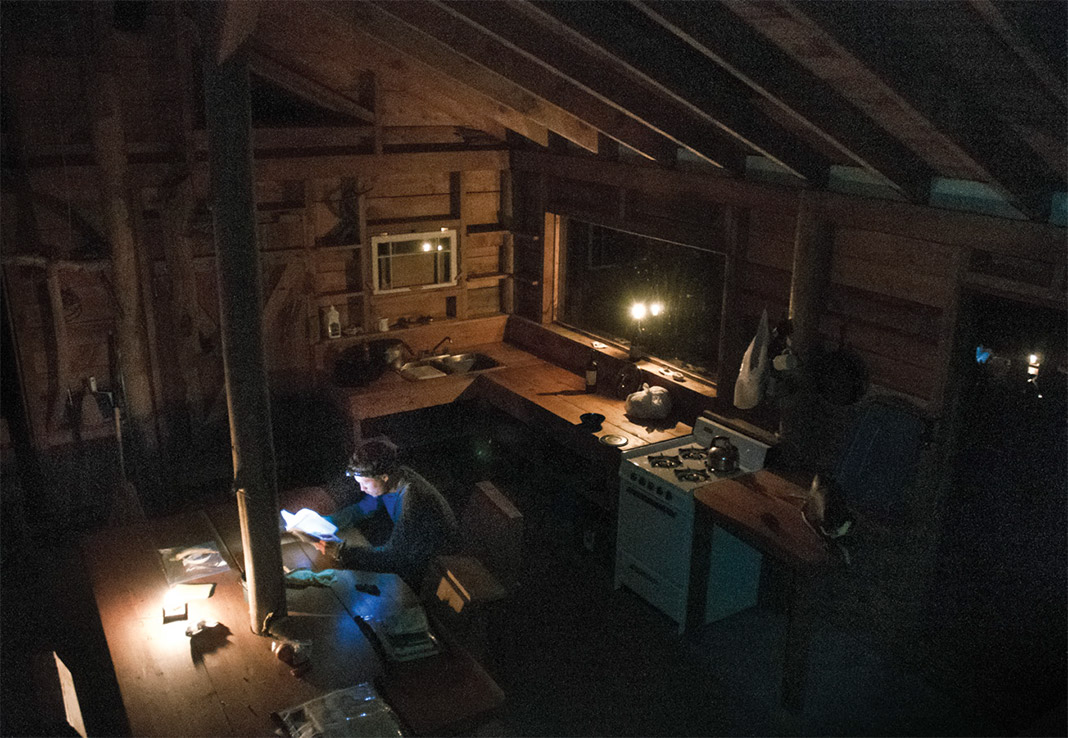
Getting on the first flight out
My love of adventure stems from challenging situations that make me present in the moment, but this experience was way too visceral, and my passion for adventure faded in those moments. I suddenly yearned to start a life in the city and work in the safe boundary of an office, drawing a heavy curtain around everything that is wild.
That night I tried to send 17 messages on my satellite device, daring only to lift one hand to text my friend 55 km away: “I NEED A PICK UP RIGHT AWAY. PLEASE SEND A FLOATPLANE!!!”
Of course, I didn’t have a clear view of the sky from my hideaway under the roof. Still, I prayed that the messages would somehow send through the tiny air circulation window under the gable. I couldn’t imagine moving to a more exposed spot.
As dawn slowly seeped into the cabin, I carefully allowed my ears to listen again and my eyes to see again. I tentatively climbed down the ladder into the main living area and started packing the most necessary things into a few immersion bags. The floatplane wouldn’t be able to transport all my gear, but I didn’t care about leaving things behind.
I didn’t dare look outside.
Finally, I received a message back from my friend: “I’m on my way down to the dock. I’ll send you a floatplane!” An hour later, I heard the plane descending into the gigantic scenery of the fiord. I stepped outside into the overcast morning without turning back or looking around the cabin, walked down to the water and caught the pilot’s attention with my red rain jacket.
“How are you doing?” the pilot asked, searching my face for clues.
“I’m alright,” I lied. “Just didn’t feel safe here last night. The ground was shaking and I heard the sounds of moving boulders. Might not be a good thing to be trapped in this spot in case of an earthquake or landslide, right?”
There was no way I could tell him the truth without seeming crazy. But he pressed me, curious to learn more about the sounds I had heard. I described them more precisely.
“Hmm, that sounds like Sasquatch to me,” the pilot offered. “I hear stories from people up around here who see them turning over boulders on the shoreline.”
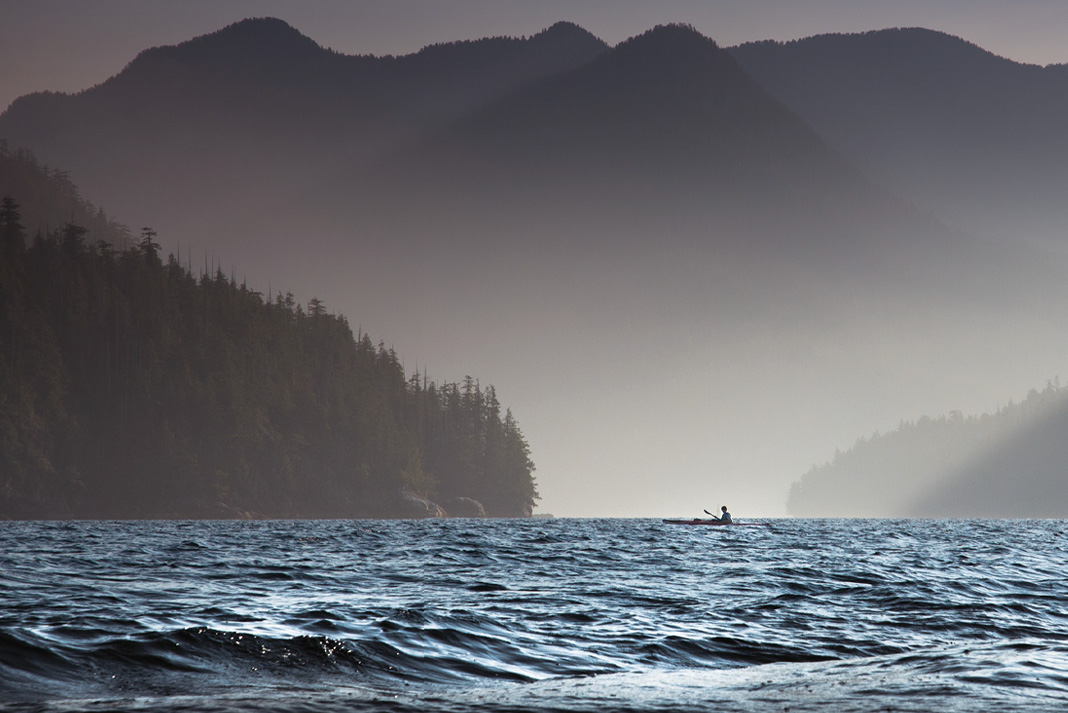
Later, my friend in Tofino would echo the pilot: “I guess there’s a reason why the First Nations call that place Home of the Sasquatch.”
The plane turned down the fiord, picking up speed and lifting into the cloudy Clayoquot morning. We flew over the dense and mysteriously fogged forest cloaking the inlet’s mountain slopes. For the first time, I saw the waters, mountain ranges, cliffs and river valleys of my favorite place from the air. I couldn’t peel my eyes away. A mere four hours before it had taught me what real fear is, and now I fell hopelessly in love with it all over again.
Sander Jain is an outdoor photojournalist with a focus on wilderness, natural history and conservation topics. His work has appeared in GEO, explore, Adventure Kayak, Natural History Magazine and Kanu.
The dramatic fiords of Clayoquot Sound humble a lone paddler. | Feature photo: Sander Jain



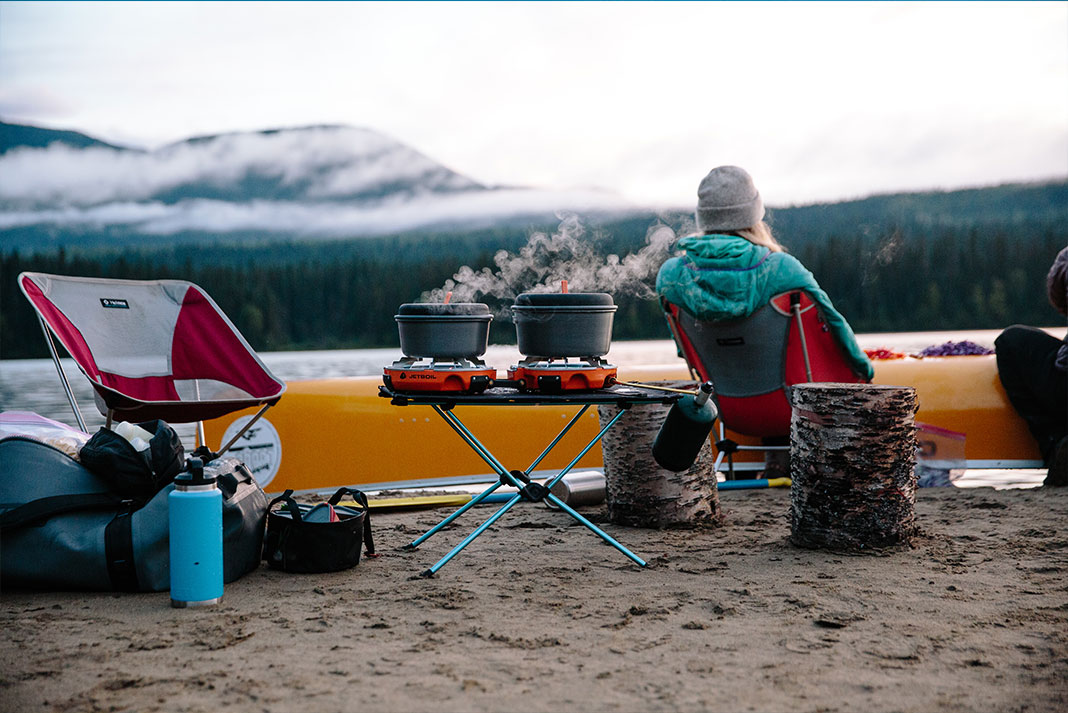
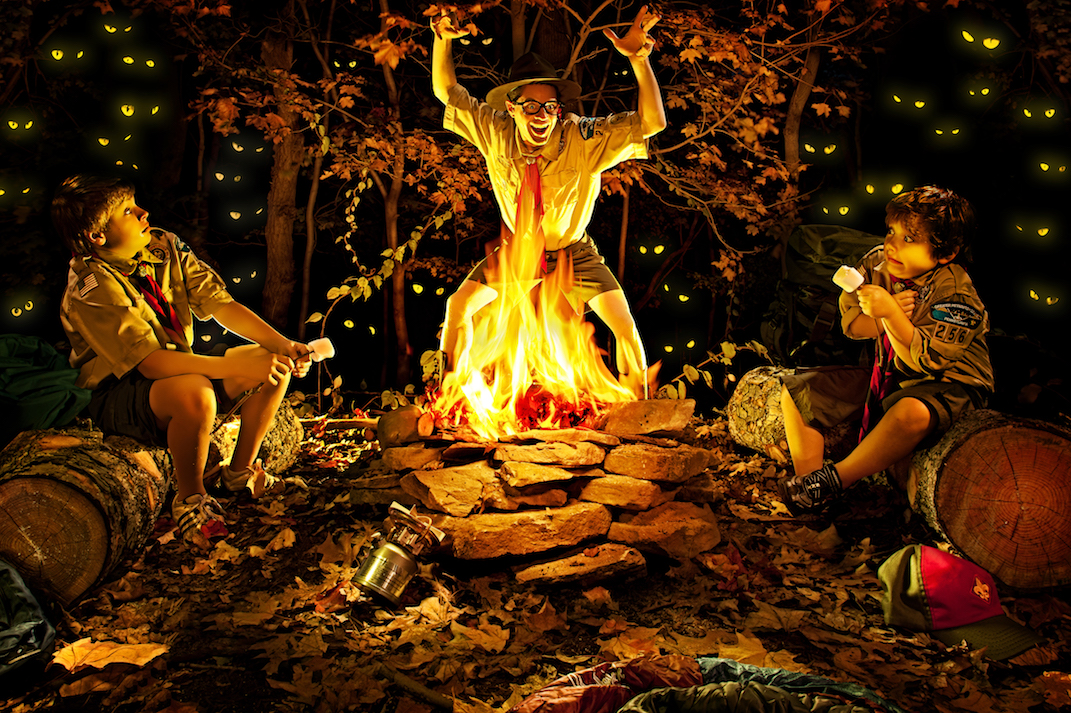
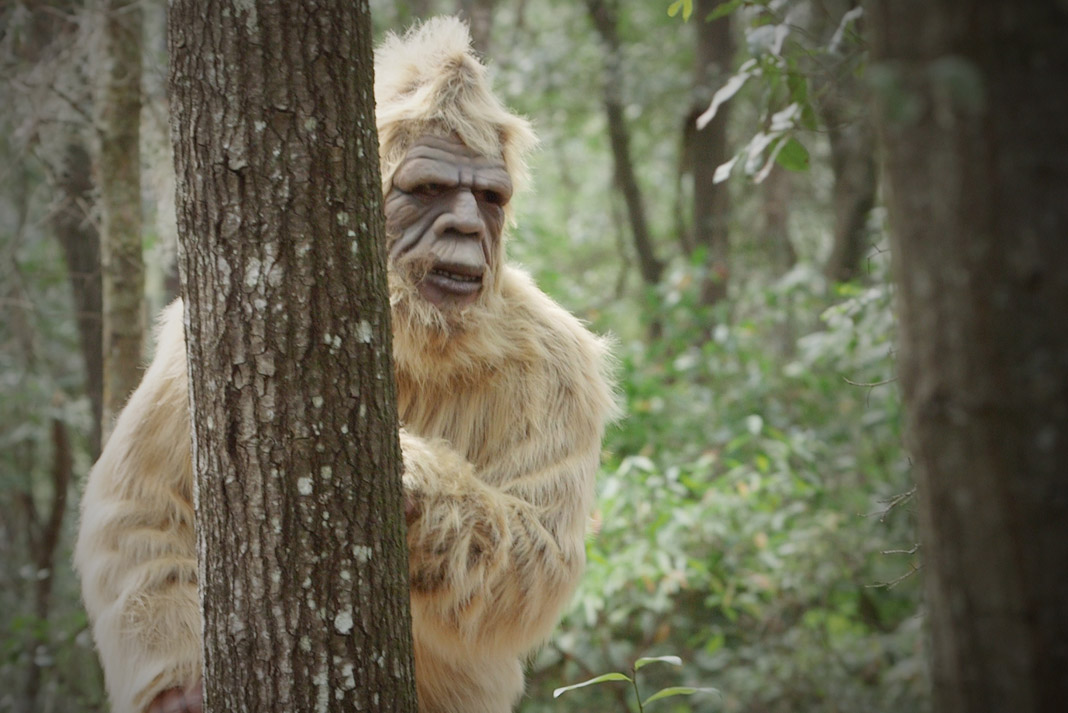
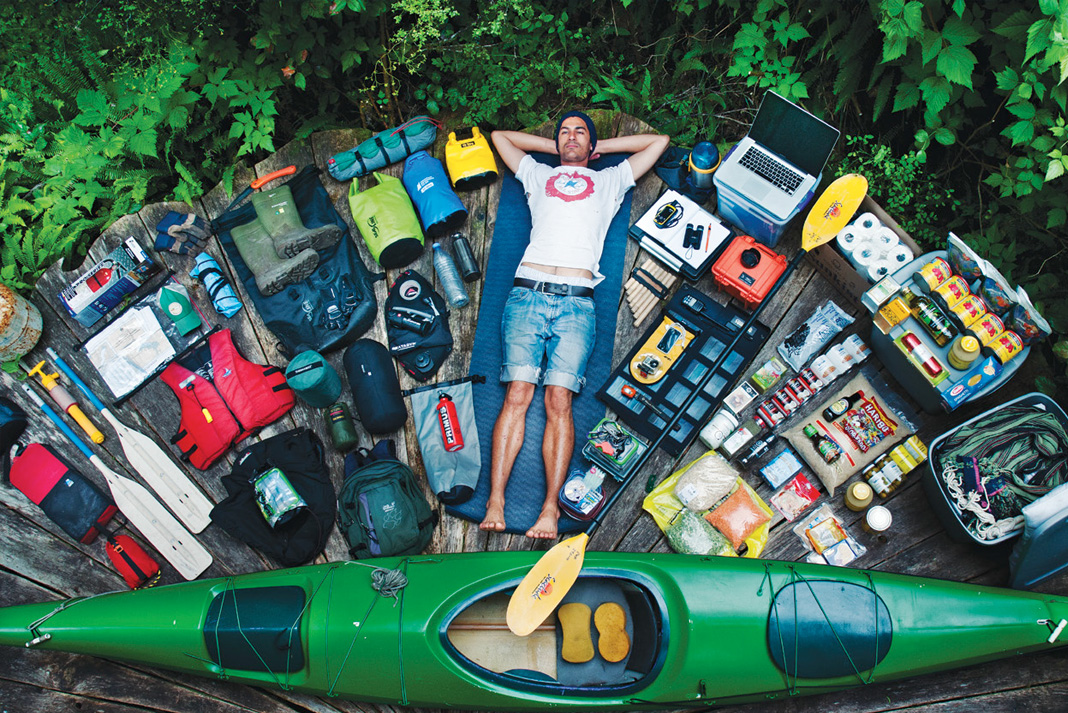
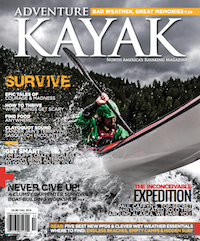
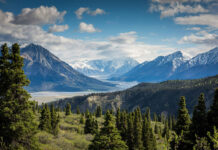
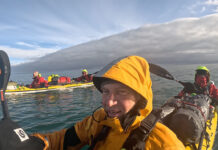
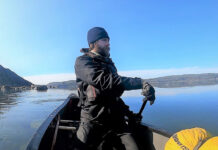
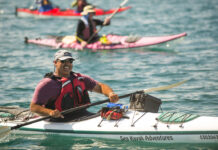
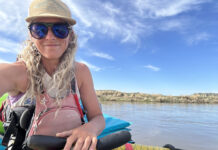

YUP! Sounds like bigfoot to me also.
Don’t let them scare you! you have every right to be there as they are. JUST bring something as a welcome gift. do some wood knocks and vocalizations … “I am here and I am NOT leaving!”
I have had many encounters too.
I am of 2 minds on this fellow’s adventure . I admire his pluck and courage to pursue a solitary trip into this wonderful area . And, I reckon that I would have a very similar reaction of primordial fear when the Sasquatch start to stomp and hoot right outside . Some schools of thought support the notion that Sasquatch can mentally project this overwhelming fear into their targets . But, I also agree with Lisa’s comment on holding your ground . ( Easy for us to say , not being there enduring the incredible intensity of the moment ) . And, I would not want to get into any type of contentious turf disagreement with the Sasquatch . But, if one could summon the mettle to somehow stand one’s ground , and make an attempt to communicate at some level ….. What do I know ? As I write these words , they strike me as flaccid . The Sasquatch might get a good chuckle and view me as naive . One might very well end up deceased and in pieces ….lol . End of comment . Good luck to all !